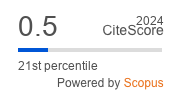The Features of Educational Work in Training Doctors with the Use of Distant Learning Technologies
Abstract
In the article the technique of carrying out educational work in the training of doctors using distance learning technologies is under consideration. The results of the study indicate that the professional education of doctors is most eff ective for self-study in the Internet of works of art: books, movies, websites of medical museums, virtual museums, online guides to cities and regions of Russia, where medical sites, followed by discussions on medical forums.
About the Author
V. N. TregubovRussian Federation
Valerij Nikolaevich Tregubov, MD, prof. of the chair of Public health and health care named after N.A. Semashko of the medical-prophylactic faculty, deputy director of the Center for Accreditation
8/2 Trubetskaya str., Moscow, 119991
tel.: 8 (495) 609-14-00 (21-66)
References
1. Алехин И.А., Ларионов С.А. Воспитание нравственных качеств у студентов вузов средствами отечественной литературы // Мир образования – образование в мире. 2010; 2: 140–141. [Alyokhin I.A., Larionov S.A. Raising the moral qualities of university students by means of national literature // Mir obrazovaniya – obrazovanie v mire. 2010; 2: 140–141.]
2. Климов С.Н. Философские аспекты воспитательной работы в вузе // Педагогическое образование и наука. 2011; 2: 4-7. [Klimov S.N. Philosophical aspects of educational work at the university // Pedagogicheskoe obrazovanie i nauka. 2011; 2: 4-7.]
3. Коротаева Е.В. Интерактивное обучение: Вопросы теории и практики обучения // Педагогическое образование в России. 2012; 2: 171-174. [Korotaeva E.V. Interactive teaching: Theory and practice of training // Pedagogicheskoe obrazovanie v Rossii. 2012; 2: 171-174.]
4. Сокол А.Ф., Шурупова Р.В. Значение литературы и искусства в становлении и гуманизации личности будущего врача // Сеченовский вестник. 2013; 2 (12): 65–69. [Sokol A.F., Shurupova R.V. The value of art and literature in the development of the individual and the humanization of the future doctor // Sechenovsky vestnik. 2013; 2 (12): 65–69.]
5. Трегубов В.Н., Сизова Ж.М. Формирование индивидуальной траектории самообразования врача-специалиста в системе непрерывного медицинского образования // Медицинское образование и профессиональное развитие. 2014; 4: 91-99. [Tregubov V.N., Sizova Zh.M. Formation of an individual trajectory of self a specialist in continuing medical education // Meditsinskoe obrazovanie i professionalnoe razvitie. 2014; 4: 91-99.]
6. Шишлина Н.В., Савинова А.Р. Задачи преподавателя электронного курса // Открытое и дистанционное образование. 2013; 1 (49): 77–82. [Shishlina N.V., Savinova A.R. Tasks of the teacher of e-learning course // Otkrytoe i distantsionnoe obrazovanie. 2013; 1 (49): 77–82.]
7. Шкапенко Т.М. Электронное обучение: актуальное состояние проблемы в вузовской системе образования России и зарубежных стран // Вестник МГИМО Университета. 2013; 6 (33): 71-76. [Shkapenko T.M. E-learning: the current state of the problem in the university education system in Russia and abroad // Vestnik MGIMO Universiteta. 2013; 6 (33): 71-76.






































